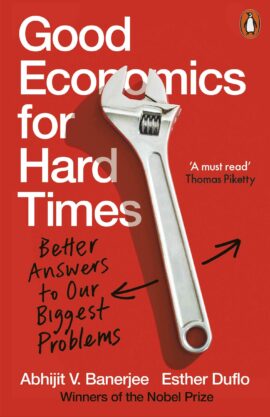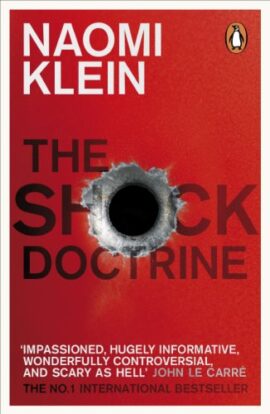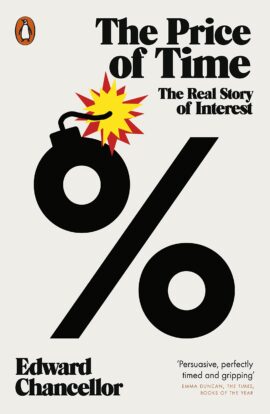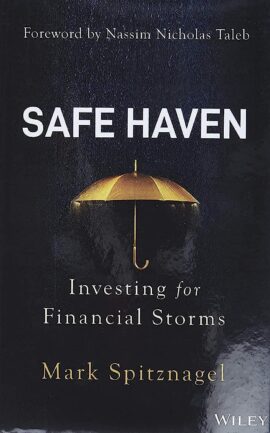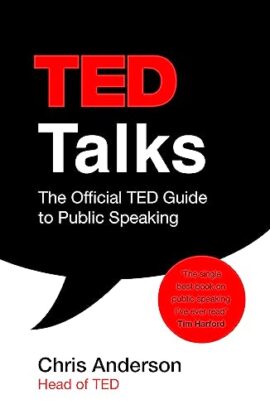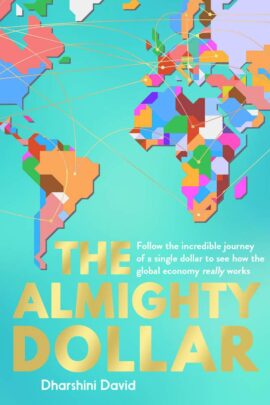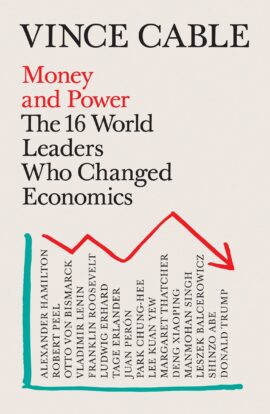«Lunch with the FT: A Second Helping» a été ajouté à votre panier. Voir le panier
Hit Refresh: A Memoir by Microsoft’s CEO
2.300,00 د.ج
Hit Refresh: A Memoir by Microsofts CEO [Paperback] Nadella, Satya
2
Items sold in last 3 days
Félicitation ! vous bénéficiez d'une livraison gratuite !
0
People watching this product now!
Estimated delivery dates: septembre 24, 2025 – octobre 1, 2025
Catégorie : Business
Description
Hit Refresh: A Memoir by Microsofts CEO [Paperback] Nadella, Satya
Informations complémentaires
| Editeur |
|---|
Produits similaires
Good Economics for Hard Times: Better Answers to Our Biggest Problems
2.530,00 د.ج
FROM THE WINNERS OF THE 2019 NOBEL PRIZE IN ECONOMICS'Wonderfully refreshing . . . A must read' Thomas PikettyIn this revolutionary book, prize-winning economists Abhijit V. Banerjee and Esther Duflo show how economics, when done right, can help us solve the thorniest social and political problems of our day. From immigration to inequality, slowing growth to accelerating climate change, we have the resources to address the challenges we face but we are so often blinded by ideology.Original, provocative and urgent, Good Economics for Hard Times offers the new thinking that we need. It builds on cutting-edge research in economics - and years of exploring the most effective solutions to alleviate extreme poverty - to make a persuasive case for an intelligent interventionism and a society built on compassion and respect. A much-needed antidote to polarized discourse, this book shines a light to help us appreciate and understand our precariously balanced world.
The Shock Doctrine: The Rise of Disaster Capitalism
3.450,00 د.ج
Around the world in Britain, the United States, Asia and the Middle East, there are people with power who are cashing in on chaos: exploiting bloodshed and catastrophe to brutally remake our world in their image. They are the shock doctors. Thrilling and revelatory, "The Shock Doctrine" cracks open the secret history of our era. Exposing these global profiteers, Naomi Klein discovered information and connections that shocked even her about how comprehensively the shock doctors' beliefs now dominate our world - and how this domination has been achieved. Raking in billions out of the tsunami, plundering Russia, exploiting Iraq - this is the chilling tale of how a few are making a killing while more are getting killed.
The Price of Time
1.950,00 د.ج
*Longlisted for the 2022 Financial Times Business Book of the Year Award*All economic and financial activities take place across time. Interest coordinates these activities. The story of capitalism is thus the story of interest: the price that individuals, companies and nations pay to borrow money.In The Price of Time, Edward Chancellor traces the history of interest from its origins in ancient Mesopotamia, through debates about usury in Restoration Britain and John Law ' s ill-fated Mississippi scheme, to the global credit booms of the twenty-first century. We generally assume that high interest rates are harmful, but Chancellor argues that, whenever money is too easy, financial markets become unstable. He takes the story to the present day, when interest rates have sunk lower than at any time in the five millennia since they were first recorded - including the extraordinary appearance of negative rates in Europe and Japan - and highlights how this has contributed to profound economic insecurity and financial fragility.Chancellor reveals how extremely low interest rates not only create asset price inflation but are also largely responsible for weak economic growth, rising inequality, zombie companies, elevated debt levels and the pensions crises that have afflicted the West in recent years - conditions under which economies cannot possibly thrive. At the same time, easy money in China has inflated an epic real estate bubble, accompanied by the greatest credit and investment boom in history. As the global financial system edges closer to yet another crisis, Chancellor shows that only by understanding interest can we hope to face the challenges ahead.
Good Economics for Hard Times: Better Answers to Our Biggest Problems
2.530,00 د.ج
FROM THE WINNERS OF THE 2019 NOBEL PRIZE IN ECONOMICS'Wonderfully refreshing . . . A must read' Thomas PikettyIn this revolutionary book, prize-winning economists Abhijit V. Banerjee and Esther Duflo show how economics, when done right, can help us solve the thorniest social and political problems of our day. From immigration to inequality, slowing growth to accelerating climate change, we have the resources to address the challenges we face but we are so often blinded by ideology.Original, provocative and urgent, Good Economics for Hard Times offers the new thinking that we need. It builds on cutting-edge research in economics - and years of exploring the most effective solutions to alleviate extreme poverty - to make a persuasive case for an intelligent interventionism and a society built on compassion and respect. A much-needed antidote to polarized discourse, this book shines a light to help us appreciate and understand our precariously balanced world.
Safe Haven: Investing for Financial Storms
5.520,00 د.ج
What is a safe haven?What role should they play in an investment portfolio? Do we use them only to seek shelter until the passing of financial storms? Or are they something more? Contrary to everything we know from modern financial theory, can higher returns actually come as a result of lowering risk? In Safe Haven, hedge fund manager Mark Spitznagel—one of the top practitioners of safe haven investing and portfolio risk mitigation in the world—answers these questions and more. Investors who heed the message in this book will never look at risk mitigation the same way again.
TED Talks
2.530,00 د.ج
In Ted Talks Chris Anderson, head of TED, reveals the inside secrets of how to give a first-class presentation. Where books like Talk Like TED and TED Talks Storytelling whetted the appetite, here is the official TED guide to public speaking from the man who put TED talks on the world's stage. 'Nobody in the world better understands the art and science of public speaking than Chris Anderson. He is absolutely the best person to have written this book' Elizabeth Gilbert.Anderson shares his five key techniques to presentation success: Connection, Narration, Explanation, Persuasion and Revelation (plus the three to avoid). He also answers the most frequently asked questions about giving a talk, from 'What should I wear?' to 'How do I handle my nerves?'.Ted Talks is also full of presentation tips from such TED notable speakers as Sir Ken Robinson, Bill Gates, Mary Roach, Amy Cuddy, Elizabeth Gilbert, Dan Gilbert, Amanda Palmer, Matt Ridley and many more. This is a lively, fun read with great practical application from the man who knows what goes into a truly memorable speech. In Ted Talks Anderson pulls back the TED curtain for anyone who wants to learn how to prepare an exceptional presentation.
The Almighty Dollar: Follow the Incredible Journey of Single Dollar to See How the Global Economy Really Works
2.530,00 د.ج
Have you ever wondered why we can afford to buy far more clothes than our grandparents ever could ... but may be less likely to own a home in which to keep them all? Why your petrol bill can double in a matter of months, but it never falls as fast? Behind all of this lies economics. It's not always easy to grasp the complex forces that are shaping our lives. But by following a dollar on its journey around the globe, we can start to piece it all together. The dollar is the lifeblood of globalisation. Greenbacks, singles, bucks or dead presidents: call them what you will, they are keeping the global economy going. Half of the notes in circulation are actually outside of the USA - and many of the world's dollars are owned by China. But what is really happening as our cash moves around the world every day, and how does it affect our lives? By following $1 from a shopping trip in suburban Texas, via China's central bank, Nigerian railroads, the oilfields of Iraq and beyond, The Almighty Dollar reveals the economic truths behind what we see on the news every day. Why is China the world's biggest manufacturer - and the USA its biggest customer? Is free trade really a good thing? Why would a nation build a bridge on the other side of the planet? In this illuminating read, economist Dharshini David lays bare these complex relationships to get to the heart of how our new globalised world works, showing who really holds the power, and what that means for us all.
Money and Power: The World Leaders Who Changed Economics
2.530,00 د.ج
Through economics, our politicians have the power to transform people's lives for better or worse. Think Deng Xiaoping who lifted millions out of poverty by opening up China: Franklin D Roosevelt whose 'New Deal' helped the USA break free of the Great Depression. Or Peron and his successors in Argentina who brought the country to the brink of ruin. In this magisterial history, economist and politician Vince Cable examines the legacy of 16 world leaders who transformed their countries' economic fortunes and who also challenged economic convention. From Thatcher to Trump, from Lenin to Bismarck, Money and Power provides a whole new perspective on the science of government. Examining the fascinating interplay of economics and politics, this is a compelling journey through some of the most significant people and events of the last 300 years.


